The Scoop
Why Is Vitamin C So Great For Skin & What Is The Best Form Of Vitamin C?
by Kate Grant
A year ago

WHAT MAKES VITAMIN C SO GREAT FOR SKIN?
Topical Vitamin C is one of the most clinically studied ingredients proven to help resolve many skin concerns ranging from dark spots, uneven tone, dullness, lines and wrinkles, and rough texture.
A potent antioxidant, Vitamin C helps to neutralize free radicals on the skin, preventing future cellular damage, which enables the cells to regenerate and repair.
Free radicals (also known as reactive oxygen species ROS) are molecules that are missing electrons. Those unstable molecules steal from other cells to gain their missing electrons – creating what is known as "free radical cascade," a circular process that creates more unstable free radicals. ROS free radicals are a natural part of the biological process and can be triggered/exacerbated by external factors like UV rays, pollution, toxins, alcohol, and other environmental aggressors. If free radicals overwhelm the body's ability to regulate them, a condition known as oxidative stress ensues. Oxidative stress that is left unchecked can begin to affect many parts of the body, including DNA, Collagen, and Lipids, and will show up as wrinkles, dark spots, uneven tone, dullness. Application of an external source of antioxidants can assist in coping with this oxidative stress.
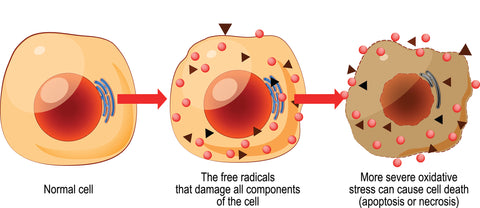
Antioxidants act as a defense mechanism by helping to keep free radicals in check. They do this by giving an electron to the unstable free radical without destabilizing themselves – in turn, stopping the free radical cascade. This free radical neutralizer helps to offset daily aggressors like UV damage and air pollution and may even help protect against precancerous changes resulting from UV exposure.
Vitamin C serum benefits
- reduces wrinkles
- protects collagen and increases production
- aids wound healing
- helps protect against sun damage
- reduces hyperpigmentation
- evens skin tone
- brightens complexion
- fights free radicals from UV and pollution
Its antioxidant properties are not the only reason that Vitamin C is the MVP of skincare routines.
Vitamin C is excellent for those looking to help slow the signs of aging, as it triggers the skins natural healing properties and accelerates the production of Collagen and Elastin. Collagen and Elastin are the proteins responsible for keeping your skin plump and youthfully firm.
One of the most well-known benefits of Vitamin C is that it inhibits melanin production. Overactive melanin production can result in discoloration like dark spots and hyperpigmentation. Over time, topical Vitamin C can help reduce the appearance of dark spots and help prevent future discoloration without disrupting the skin's natural pigmentation.
WHAT IS THE BEST FORM OF VITAMIN C?
These days, just about every brand touts a Vitamin C serum, but the truth is, some simply work better than others. Many people focus solely on the percentage of Vitamin C in the formula, but the more informed skincare aficionados know that it is the type of Vitamin C that matters most.
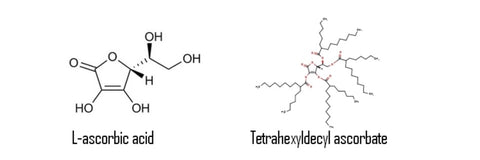
Most Vitamin C products utilize the water-soluble form of Vitamin C (L-Ascorbic Acid) because of its low cost and availability. While L-Ascorbic Acid is a much more affordable raw material to formulate with, there are many drawbacks to using it.
L-Ascorbic Acid is highly unstable and oxidizes (turns brown or beige) when combined with water – often before you even finish the product. Once L-Ascorbic Acid oxidizes, it turns into Dehydroascorbic Acid (which converts to 2,3-diketogulonic acid, which then turns into Erythrulose) and can cause further oxidative stress and damage to the skin. Erythrulose is one of the main ingredients in self-tanners, so if you use an old or oxidized Vitamin C, the chances are that you will notice your face getting a little darker, which is the opposite of what you want your Vitamin C serum to do.
Another drawback with L-Ascorbic Acid is that because it is water-soluble, it cannot make it past the lipid-rich skin barrier to the deeper layers of the dermis where collagen production occurs. Think of it this way: water will just run right off of oil, so you need another oil-based substance to penetrate the protective oil-rich barrier of the skin, which is why we formulated with BV-OSC Vitamin C (Tetrahexyldecyl Ascorbate / THD Ascorbate).
L-Ascorbic Acid
x Highly unstable
x Can cause redness & irritation
x Requires higher percentages to penetrate the skin
x Degrades (oxidizes) upon contact with oxygen and light
Tetrahexyldecyl Ascorbate (BV-OSC)
- Most stable form of Vitamin C
- Works well for sensitive skin
- Oil-soluble quickly penetrates to the deeper layers of the skin
- Does not oxidize, so you can be sure you are getting the most out of every drop of product
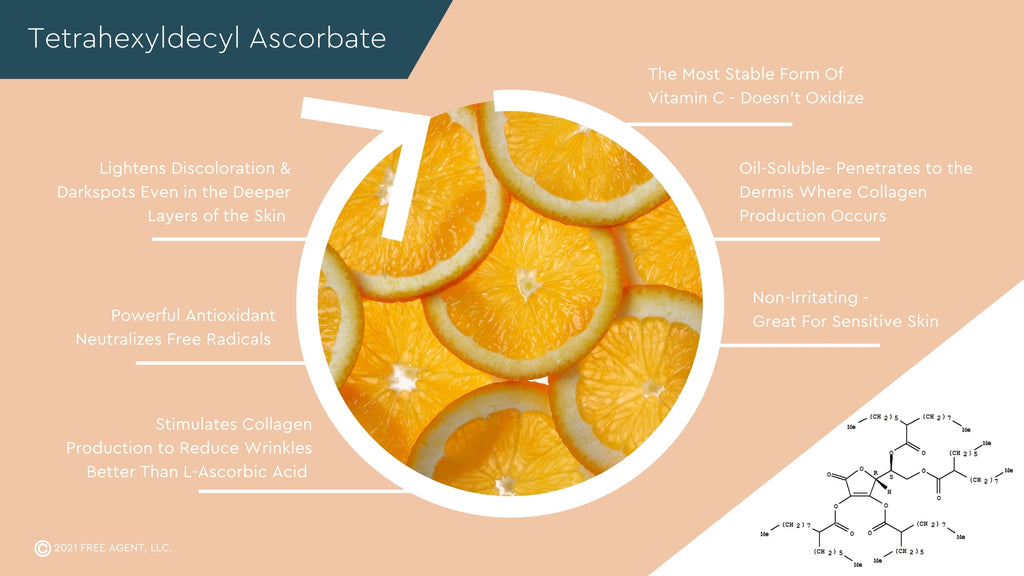
BV-OSC Vitamin C is lipid-soluble, and therefore can successfully penetrate the epidermis to the layer underneath called the dermis, which is where collagen is produced. Because BV-OSC penetrates to the dermis, you don't need as much of it to achieve maximum benefits of lightening dark spots and boosting collagen, all without the downside of over-sensitivity from high levels of L-Ascorbic Acid.
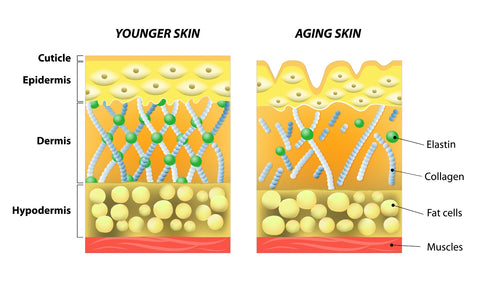
WHAT BV-OSC VITAMIN C IS GOOD FOR:
- Dark Spots
- Sun Spots
- Dull Skin
- Acne Scarring
- Anti-Aging
- All Skin Types
- Pregnancy Safe
WHAT BV-OSC VITAMIN C DOES:
- Clinically proven BV-OSC Vitamin C reduces the appearance of sun damage, dark spots and acne scarring
- Squalane locks in moisture to improve the look of skin elasticity
- Brightens overall skin tone
- Creates a lit-from-within glow
- Stimulates Collagen Synthesis
- The advanced delivery system increases the absorption rate for non-greasy dry down
Backed by clinical research, BV-OSC Vitamin C is proven to reduce dark spots and increase levels of type 1 collagen. With 25% better absorption than regular L-Ascorbic Acid, BV-OSC has shown the highest level of efficacy in cell viability for its antioxidant properties and is proven to help stimulate collagen synthesis, reduce the appearance of UV related damage and dark spots, and assist in preventing blue light damage to collagen and Elastin. BV-OSC has even been known to treat Psoriasis, Eczema, and Atopic Dermatitis in clinical settings.
All in all, this is one ingredient that helps fight skin damage and the signs of aging from multiple angles. For us, it's a holy grail ingredient and is featured in our LIGHTSPEED Hydra Glow C Serum.
The results speak for themselves.
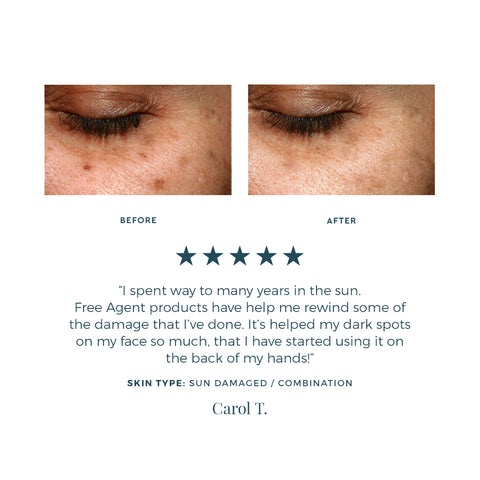
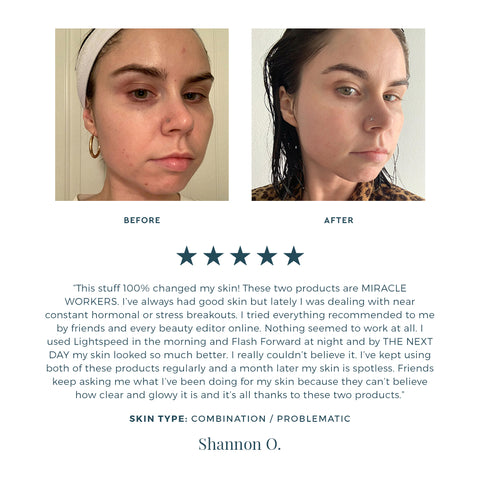
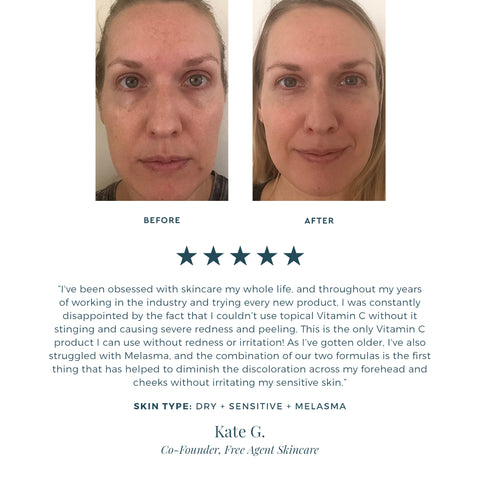

0 comments